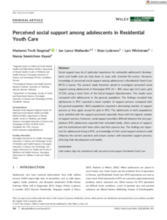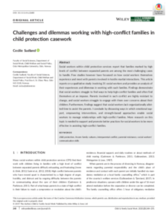Displaying 51 - 60 of 111
Building on 10 qualitative interviews with parents of children in Norwegian Child Welfare Services, this paper discusses parents' views on collaboration between children and child welfare professionals.
Building on 10 qualitative interviews with parents of children in Norwegian Child Welfare Services, this paper discusses parents' views on collaboration between children and child welfare professionals.
Building on 10 qualitative interviews with parents of children in Norwegian Child Welfare Services, this paper discusses parents' views on collaboration between children and child welfare professionals.
The purpose of this webinar is to shed light on the specific experiences and issues of unaccompanied and separate girls in the European Response.
The purpose of this paper is to address how young unaccompanied refugees in Norway actively engage in interpersonal relationships.
Social support may be of particular importance for vulnerable adolescents' development and health and can help them to cope with stressful life events. However, knowledge of perceived social support among adolescents in Residential Youth Care (RYC) is sparse. The present study therefore aimed to investigate perceived social support among adolescents in Norwegian RYC (N = 304, mean age 16.3 years, girls 57.2%), using a short form of the Social Support Questionnaire.
The aim of this article [from the Child & Family Social Work special issue on teenagers in foster care] is to account for and discuss support to young care leavers within the comparable welfare regimes of Norway and Sweden and to explore key differences between these 2 countries.
This article reports on a qualitative study involving 31 social workers and provides an analysis of their experiences and dilemmas in working with families marked by high levels of conflict between separated parents.
Without access to their own families, how do young, unaccompanied refugee minors re-establish their social lives in ways that facilitate a sense of togetherness in their everyday lives during resettlement? This question was approached by exploring young persons’ creation of relational practices and the kinds of sociomaterial conditions that seemed to facilitate the evolvement of these practices in Norway, including the professional caregivers’ contributions.
This article elucidates the challenges parents face when they lose the care of their children and their experiences of family counselling as a support service in Norway.


